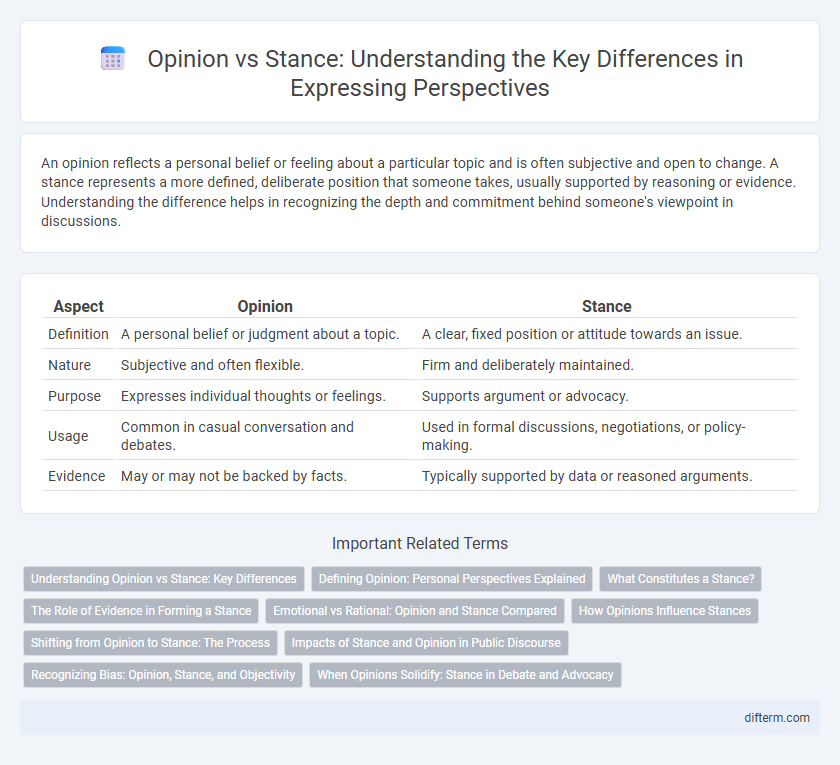An opinion reflects a personal belief or feeling about a particular topic and is often subjective and open to change. A stance represents a more defined, deliberate position that someone takes, usually supported by reasoning or evidence. Understanding the difference helps in recognizing the depth and commitment behind someone's viewpoint in discussions.
Table of Comparison
| Aspect | Opinion | Stance |
|---|---|---|
| Definition | A personal belief or judgment about a topic. | A clear, fixed position or attitude towards an issue. |
| Nature | Subjective and often flexible. | Firm and deliberately maintained. |
| Purpose | Expresses individual thoughts or feelings. | Supports argument or advocacy. |
| Usage | Common in casual conversation and debates. | Used in formal discussions, negotiations, or policy-making. |
| Evidence | May or may not be backed by facts. | Typically supported by data or reasoned arguments. |
Understanding Opinion vs Stance: Key Differences
Opinion reflects a personal belief or judgment formed about a particular topic, often influenced by emotions and experiences, while stance signifies a deliberate and public position taken on an issue, typically grounded in reasoning and evidence. Understanding opinion versus stance involves recognizing that opinions are subjective expressions, whereas stances are articulated viewpoints that guide actions or arguments. This distinction is crucial in debates, decision-making, and communication, where clarity about one's stance informs credibility and persuasion more effectively than mere opinions.
Defining Opinion: Personal Perspectives Explained
Opinion reflects an individual's personal beliefs, feelings, or thoughts about a subject, shaped by unique experiences and values. Unlike a stance, which is a deliberate position taken on a specific issue or argument, an opinion is more fluid and subjective. Understanding opinion involves recognizing its basis in personal perspective rather than objective evidence or formal arguments.
What Constitutes a Stance?
A stance represents a deliberate, well-defined position on a specific issue, grounded in evidence or core beliefs. Unlike general opinions, which can be casual or fluid, a stance involves a committed viewpoint that guides decision-making and behavior. Clear articulation of reasons and consistency over time are key attributes that constitute a strong stance.
The Role of Evidence in Forming a Stance
A well-formed stance relies heavily on credible evidence, distinguishing it from a mere opinion that may stem from personal feelings or assumptions. Evidence such as data, research findings, and documented experiences lend weight and validity, enabling a stance to be defended logically and persuasively. Without solid evidence, a stance risks being perceived as subjective or uninformed, undermining its influence in debates or decision-making processes.
Emotional vs Rational: Opinion and Stance Compared
Opinion often reflects emotional responses shaped by personal experiences and feelings, emphasizing subjective perspectives. Stance typically involves a rational evaluation based on evidence and logical reasoning, highlighting a deliberate position on a topic. Understanding the distinction between emotional opinions and rational stances enhances critical thinking and effective communication.
How Opinions Influence Stances
Opinions shape stances by providing the foundational beliefs that guide individual or group positions on issues. Strongly held opinions often solidify into stances that influence decision-making and advocacy efforts within social or political contexts. The dynamic between evolving opinions and fixed stances plays a crucial role in public discourse and policy formation.
Shifting from Opinion to Stance: The Process
Shifting from opinion to stance involves deepening personal viewpoints into well-defined positions supported by evidence and critical reasoning. This process requires evaluating information, considering multiple perspectives, and articulating a clear, consistent argument to strengthen credibility and influence. Developing a stance transforms subjective opinions into objective, actionable beliefs within discussions and debates.
Impacts of Stance and Opinion in Public Discourse
Stance shapes public discourse by influencing group identity and framing social debates, often driving collective action or resistance, while opinion reflects individual judgments that contribute to the diversity of perspectives within society. The impact of stance lies in its ability to mobilize communities and polarize audiences, reshaping political and cultural landscapes. Opinion, though more fluid, informs democratic processes by encouraging dialogue and critical evaluation of policies and social norms.
Recognizing Bias: Opinion, Stance, and Objectivity
Recognizing bias requires distinguishing between opinion, characterized by personal beliefs and subjective expressions, and stance, which reflects a more deliberate position influenced by context and evidence. Objectivity emerges when information is presented without personal bias, allowing for balanced evaluation and critical thinking. Understanding these differences enhances media literacy and promotes informed decision-making in analyzing texts and arguments.
When Opinions Solidify: Stance in Debate and Advocacy
Opinions form the foundation of personal beliefs, while stances represent more defined, often unwavering positions adopted during debate and advocacy. When opinions solidify into stances, they reflect not only individual values but also strategic communication aimed at influencing public discourse and policy. This transformation highlights the role of rhetorical framing and evidence in strengthening commitment to a cause or argument.
opinion vs stance Infographic

 difterm.com
difterm.com